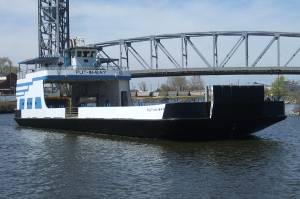
Great Lakes Shipyard, a division of The Great Lakes Group, has completed all work required under contract with Miller Boat Line, Put-in-Bay, Ohio, to fabricate and install a new 40-ft mid-body extension in the passenger/vehicle ferry Put-in-Bay. The contract was awarded on August 17, 2009, and all work was completed at Great Lakes Shipyard facilities on the South Bank of the Old River Channel, on Cleveland's Cuyahoga River.
What started out as a straight forward mid-body extension project grew into a complete rebuild, including replacement of the main engines with new CAT C18 diesels. The mid-body extension of the Put-in-Bay increased the length of the vessel from 96-ft to 136-ft overall and nearly doubled its carrying capacity. The project also included the installation of new rudders, a new steering system, new main engine keel cooling system, generator overhauls and new propellers.
Miller Boat Line’s fleet includes three additional all-steel passenger/vehicle ferries, each approximately 96-ft in length, which run on Lake Erie from Catawba to the islands of Put-in-Bay (South Bass Island) and Middle Bass Island, Ohio.
www.thegreatlakesgroup.com



